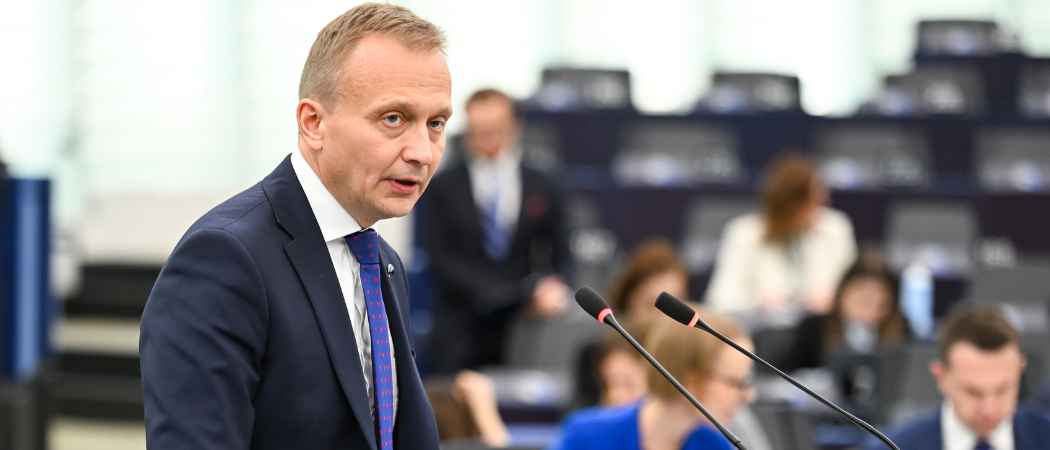The Commission’s roadmap for the 2028-34 budget has renewed fears that research and innovation will disappear into a European Competitiveness Fund

Piotr Serafin, Commissioner for Budget, Anti-Fraud and Public Administration. Photo credits: Brigitte Hase / European Union
The European Commission is kicking off consultations on the post-2027 EU budget, which it wants to be ambitious “both in size and design” in the face of geopolitical tensions to unfair global competition.
“The status quo is not an option,” the Commission writes in its outline for the 2028-34 budget, or Multiannual Financial Framework (MFF), published on Wednesday.
At its core is a Competitiveness Fund to “support strategic sectors and technologies critical to the EU competitiveness,” including research and innovation. “The Fund’s comprehensive architecture will allow it to accompany European projects along the entire investment journey, from research, through scale-up, industrial deployment, to manufacturing,” it says.
This fund will operate alongside a plan for each country, with key reforms and investments in areas such as cohesion funds, allowing resources to be linked to performance.
It is unclear whether, and how, the Commission plans to fund research and innovation in fields that are not deemed to be strategic and do not therefore fall under the Competitiveness Fund.
The roadmap set off alarm bells for research organisations and universities, which already worry that research funding could fall under the Competitiveness Fund rather than a standalone Framework Programme to replace Horizon Europe.
At the Science|Business conference last week, MEP Christian Ehler insisted that “there will be a Framework Programme 10.” Marc Lemaître, director general for research and innovation at the European Commission, said the Commission would respect the EU treaty, which provides a legal basis for a Framework Programme, but he was unable to confirm whether FP10 would have a ringfenced budget.
Lidia Borrell-Damián, secretary general of Science Europe, fears that including FP10 in the Competitiveness Fund implies losing “curiosity-driven, blue-sky research” essential to drive societal progress and address ongoing challenges. She also wants clarification on the research and innovation areas that qualify for Important Projects of Common European Interest and how research outside this scope will be supported.
Meanwhile, the document reiterates Commission President Ursula von der Leyen’s desire to put research and innovation at the heart of the EU economy: “Europe’s future competitiveness will depend on our ability to start a new age of invention and ingenuity,” it says.
Mattias Björnmalm, secretary general of the CESAER university association, supports this ambition, but points out that Horizon Europe already offers a proven tool for boosting European research and innovation. As such, he finds it “deeply concerning” that the Commission’s MFF plans do not explicitly mention its successor.
“This would have been an ideal opportunity to set out a vision for significantly expanding the resources for the programme to match this ambition,” he said.
On the other hand, if placing FP10 under a Competitiveness Fund in the next MFF helps politically to secure a substantial funding increase, the change could be acceptable. “As long as the programme builds on best practices from Horizon Europe, including its structures and rules of participation, its exact political or legal positioning matters less,” he said.
For Borrell-Damián, however, “a truly future-oriented Union must safeguard free scientific inquiry, best ensured through an independent research and innovation Framework Programme that complements, but remains distinct from, other funding instruments.”
On his end, Jan Palmowski, secretary general of the Guild of European Research-Intensive Universities, questioned the evidence to suggest that the status quo is not an option for research funding. “Europe may be falling behind in research and innovation, but after decades of national underinvestment that is despite, rather than because, of European Framework Programmes,” he wrote on social media.
Budget flexibility
The Commission’s plan acknowledges a deficiency in EU support for innovation, observing that the budget does not provide seamless financing from research through development to deployment. “This fragmentation, coupled with complexity and rigidities, weighs on the effectiveness of EU funding,” it says.
At the same time, public spending on research and innovation is “insufficiently focused on breakthrough innovation” and lacks scale, the Commission writes. Private investment is also deficient, with EU companies spending €270 billion less on R&D than US firms in 2021.
The Commission intends to simplify and reduce the number of instruments to enable “a true policy-based budget.” This contrasts with the current budget, which is “too much driven by the structures of spending programmes,” resulting in overlapping programmes and delays due to an over-abundance of programming documents.
Simplifying access to EU funds will also be a priority, particularly for SMEs. The Commission hopes to introduce a “true single point of entry for beneficiaries to all EU funding and advisory services” in the next MFF.
Funding challenge
The EU has set ambitious goals in terms of competing with the US and China on new technologies while ramping up its defence preparedness, and this will require tough choices to be made in the next budget.
From 2028, the EU will repay the borrowing incurred for the NextGenerationEU programme, which supported member states’ recovery from the pandemic. Repayments could amount to €25-30 billion per year through the next budget period, which is almost 20% of the current budget. This means that the EU “must maximise the impact of every euro it spends,” the Commission says.
“Europe needs to square the circle: there cannot be an EU budget fit for our ambitions and notably ensuring the reimbursement of NextGenerationEU and, at the same time, stable national financial contributions without introducing new own resources.”
Expansion of these ‘own resources,’ which currently include instruments such as the Emissions Trading Scheme, is currently blocked by EU governments. The Commission calls for work on new options to resume.
For the next 12 weeks, a public consultation on the Commission’s plan will take place to gather opinion on the future MFF. Between March and May, the Commission will also convene a panel of 150 EU citizens who will be asked to make concrete recommendations on the plan.
“The next long-term EU budget needs to be designed in a collective effort,” said budget commissioner Piotr Serafin.
Meanwhile, the European Parliament will adopt an own-initiative report on the next long-term EU budget in May. The Commission hopes to publish its full proposal in July.





 A unique international forum for public research organisations and companies to connect their external engagement with strategic interests around their R&D system.
A unique international forum for public research organisations and companies to connect their external engagement with strategic interests around their R&D system.